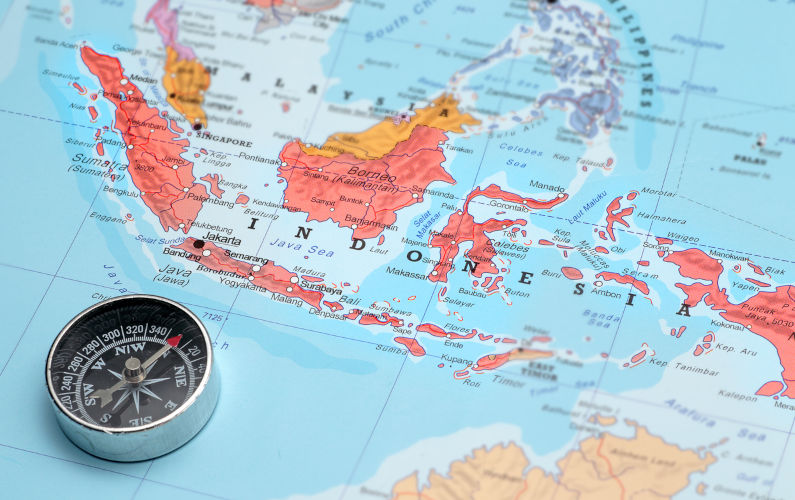Last week, Indonesia, our biggest and closest neighbour, deposited its instrument of ratification of the Treaty on the Prohibition of Nuclear Weapons (TPNW) at the UN. This was a major international and regional development, a good-news story with a very positive impact on international security, but we’ve heard virtually nothing about it from our government and very little in the media.
It should be treated as major news.
Another neighbour, the Solomon Islands also ratified the TPNW last week; other states signed up too, bringing the total number of signatories to 98. That’s pretty good for a treaty which only entered into force in 2021; and more countries will join in coming years. This is important at a time when two of the nine nuclear armed states (Russia and Israel) are overtly threatening to use their nuclear weapons (the other seven nuclear states also threaten to do this; they’ve just been a little less open in saying so).
The Indonesian ratification is also a sober reminder that there are still around 12,500 nuclear weapons in existence, many of them far more destructive than the Hiroshima bomb, and a reminder that the world still lives under the very real – indeed growing – threat of nuclear destruction.
Indonesia’s actions should make Australians ask why our own government remains at odds with the vast majority of our neighbours. Most of the South Pacific states, Southeast Asia, and New Zealand clearly oppose the threat of nuclear weapons.
Why is Australia intent on pleasing Washington’s and London’s military adventurism rather than joining states which support the real rules-based order – that is, the laws and values of the United Nations, which has declared these weapons of mass destruction immoral and clearly illegal? Why are we ignoring the security concerns of our near neighbours and many other like-minded states opposing nuclear weapons?
Most Australians don’t know much about Indonesia. It is a vibrant country of 280 million people, a secular democratic state with a Muslim-majority population, the largest in the world. Its transformation in recent decades has been impressive, and good for the region and the world. With strong economic growth and a rising middle class, it is tipped to be among the top five world economies within a few decades. It has an overwhelmingly young population (a quarter are aged under 14), is an inevitable part of Australia’s world via our inescapable geography and will surely become an increasingly important trading partner.
Indonesia is a leading member of the ten-state Association of Southeast Asian Nations. ASEAN has played a strong institutional role in creating a (mostly successful) region of peace, prosperity and democracy. Decades ago, it was not at all clear that this would be the outcome in a region long plagued by colonial plunder, disputed borders, varying religions and systems of governance.
ASEAN has created a Zone of Peace, Freedom and Neutrality (ZOPFAN) something surely to be welcomed in a world where a domestically embattled United States is desperately trying to retain regional dominance at any cost, including courting nuclear disaster, as it attempts to thwart an economically and militarily rising China. ASEAN states have made clear their wish not to be caught up in such a dangerous conflict. The region has long made its stance against nuclear weapons clear in the 1995 Southeast Asian Nuclear Weapon Free Zone (SEANWFZ).
Indonesia is also a founding member of the 120-nation Non-Aligned Movement, a grouping which has considerable soft-power influence on the international stage. The majority of non-aligned states view nuclear weapons not just as weapons of horrific destruction, but also as instruments of continuing domination and exploitation. Many formerly colonised states are asking the nuclear states to listen to them and to consider their security preferences. They have a point: nuclear weapon states effectively hold the entire world to ransom, as even a ‘small’ nuclear war would ultimately affect the entire globe.
Today, nine of the ten ASEAN members have signed or ratified the TPNW (as has ASEAN observer Timor-Leste), but Indonesia’s ratification is especially important because it signals a clear commitment by one of the world’s largest states to work towards the global elimination of these weapons.
Even the Philippines, another prominent ASEAN member and a US ally which has recently increased its security collaboration with the US has ratified the TPNW and vows to stay clear of any involvement in nuclear weapons.
All this suggests that Canberra should be paying more attention to the security wishes of its near neighbours. ASEAN and South Pacific states are deeply aware of the need to eliminate the catastrophic dangers that come with nuclear weapons.
As the Philippines (and other examples) have shown, Australia can, if it wishes, remain an ally of the US and join the TPNW. It will have to renounce its (self-assumed) policy of being under the US nuclear umbrella and it will need substantially to amend the secretive Joint Facilities in Pine Gap and elsewhere – but it’s time that we did these things anyway.
It is quite possible for us to revert to conventional weapons deterrence and maintain a reasonable defence capability. We should re-prioritise diplomacy and dialogue rather than rely on weapons which risk destroying humanity, other species and possibly our entire environment.
It is time we asked ourselves: where does our future lie? Is it with allies like the United States and others who clearly have no qualms about violating international law in a profound way, viz their complicity in an ongoing genocide? (As for China, its actions in its immediate arena might be troubling, but its rise does not pose a direct military threat to Australia, unless we were to join in a US war against Beijing).
By signing the TPNW, Australia will be on the right side of history and be more in sync with its region. Indonesia and other Asia-Pacific neighbours are showing the way. It’s time to work towards a peaceful and prosperous future with them, not a future blighted by the danger of nuclear annihilation.
Marianne Hanson is Associate Professor of International Relations at the University of Queensland, a member of the Asia-Pacific Leadership Forum and a Board Member of ICAN Australia.

